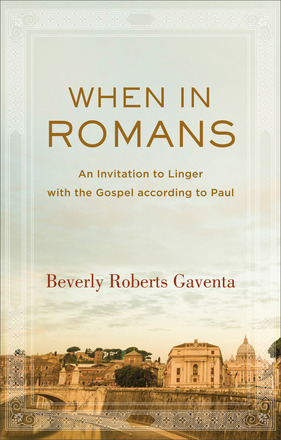
A book that I and many others have been anticipating for some time is ready for a June release (June 15th to be exact). Richard Hays, George Washington Ivey Professor of New Testament at Duke Divinity School, really needs no introduction, so I won't attempt one here, except to say, that Hays is one of the most well-respected New Testament scholars in the world today and has been for many years. At long last, the successor to his seminal work,
Echoes of Scripture in the Letters of Paul (1989), has almost arrived.
Echoes of Scriptures in the Gospels (Baylor University Press) will weigh in at a hefty 524 pages ($49.99) and looks from the blurbs listed below to be a worthy successor to his work on Paul.
 |
| Richard Hays |
Here are the particulars:
The claim that the events of Jesus' life, death, and resurrection took place "according to the Scriptures" stands at the heart of the New Testament's message. All four canonical Gospels declare that the Torah and the Prophets and the Psalms mysteriously prefigure Jesus. The author of the Fourth Gospel states this claim succinctly: in his narrative, Jesus declares, "If you believed Moses, you would believe me, for he wrote about me" (John 5:46). Yet modern historical criticism characteristically judges that the New Testament's christological readings of Israel's Scripture misrepresent the original sense of the texts; this judgment forces fundamental questions to be asked: Why do the Gospel writers read the Scriptures in such surprising ways? Are their readings intelligible as coherent or persuasive interpretations of the Scriptures? Does Christian faith require the illegitimate theft of someone else's sacred texts?
Echoes of Scripture in the Gospels answers these questions. Richard B. Hays chronicles the dramatically different ways the four Gospel writers interpreted Israel's Scripture and reveals that their readings were as complementary as they were faithful. In this long-awaited sequel to his Echoes of Scripture in the Letters of Paul, Hays highlights the theological consequences of the Gospel writers' distinctive hermeneutical approaches and asks what it might mean for contemporary readers to attempt to read Scripture through the eyes of the Evangelists. In particular, Hays carefully describes the Evangelists' practice of figural reading―an imaginative and retrospective move that creates narrative continuity and wholeness. He shows how each Gospel artfully uses scriptural echoes to re-narrate Israel's story, to assert that Jesus is the embodiment of Israel's God, and to prod the church in its vocation to engage the pagan world.
Hays shows how the Evangelists summon readers to a conversion of their imagination. The Evangelists' use of scriptural echo beckons readers to believe the extraordinary: that Jesus was Israel's Messiah, that Jesus is Israel's God, and that contemporary believers are still on mission. The Evangelists, according to Hays, are training our scriptural senses, calling readers to be better scriptural people by being better scriptural poets.
Endorsements:
"A real masterwork from one of the most creative of contemporary New Testament scholars. Anyone who feels nervous about exploring a fully theological reading of the Gospels will take heart from this comprehensive, sophisticated and profoundly nourishing account of how the Gospels themselves use Scripture theologically and invite us to do the same."―Rowan Williams, Master, Magdalene College, University of Cambridge
"In
Echoes of Scripture in the Gospels, Richard Hays reads the four Gospels with an acuity of perception that is unmatched. His attention to scriptural subtexts allows each of the evangelists' visions to emerge from behind centuries' worth of obscuring and false assumptions, and to seize one's imagination afresh. Hays' prose is elegant and his arguments are utterly persuasive. Are we really prepared to hear the evangelists speak with this kind of clarity and power?"―Susan Garrett, Dean and Professor of New Testament, Louisville Presbyterian Theological Seminary
"Richard Hays has written another wonderful book. Exhibiting the extraordinary literary sensitivity and erudition of his
Echoes of Scripture in the Letters of Paul, Hays produces here an even more important argument than in that previous, now-classic work. By tracing carefully the underpinnings of Hebrew biblical allusions in the Gospels, Hays shows how tightly these works are bound up with Israel, the God of Israel, and the Scripture of Israel. The theological implications of this work are astounding. Hays expresses it all in clear and limpid prose that makes the exegesis and the stakes clear as a bell."―Daniel Boyarin, author of The Jewish Gospels: The Story of the Jewish Christ (2012), University of California, Berkeley
"This exceptional book combines thoroughness and elegance in equal measure, also conjoining scholarly rigour with bold Christian conviction in its conclusions. Richard Hays has produced here a gripping account of the diverse approaches of the evangelists to the Old Testament, and it is a volume to which I can confidently predict I will return again and again."―Simon Gathercole, Reader in New Testament Studies and Fellow, Fitzwilliam College, University of Cambridge
"Roughly a quarter of a century after his groundbreaking monograph Echoes of Scripture in the Letters of Paul, Richard Hays stimulates the ongoing discussion of intertextuality in New Testament writings with an impressive analysis of Scripture's polyphonic resonance in the four canonical stories of Jesus and how these intertextual semantic effects contribute substantially to the meaning and rhetorical cogency of the narratives. Richard Hays' ability to survey broad fields of knowledge and to synthesize complex textual phenomena makes
Echoes of Scripture in the Gospels essential reading for everyone who is interested in the relevance of Scripture for understanding New Testament texts."―Matthias Konradt, Lehrstuhl für Neutestamentliche Theologie, Theologische Fakultät, Universität Heidelberg
"Every time Richard Hays has written a major book, he has opened our eyes to previously unimagined possibilities. This new book will do that too, only this time the view is an even more breathtaking invitation to fresh exegesis and theology.
Echoes of Scripture in the Gospels challenges us to think differently about the way we read each of the four gospels―and therefore, by implication, about the traditions and early communities that stand behind them, and ultimately the elusive but powerful figure of the master exegete whose scripture-laden story these documents are telling."―N.T. Wright, Research Professor of New Testament and Early Christianity, University of St Andrews
"In this stimulating volume, Hays aims at a conversion of our imagination. By thoroughly discussing how the four Gospels adopt Scripture and create their stories of Jesus by the use of numerous Scriptural echoes, Hays lays the foundations of a biblical theology of the Four Gospels."―Jörg Frey, Chair of New Testament Studies, University of Zürich
"Richard Hays'
Echoes of Scripture in the Gospels allows us to hear a rich chorus of voices in Scripture long silent. Like his Echoes in the Letters of Paul, Hays has performed nothing less than a Copernican revolution in turning the whole discipline of literary parallels and influences upon an author 'inside out': Instead of New Testament authors like Mark or Matthew reaching back to pluck some citation to fit their need in presenting the gospel, Hays demonstrates that it was Scripture itself pressing and prodding and pushing its way into the formative thoughts and sermons and teachings about Jesus. instead of a monotone word of the Evangelists' redaction, now suddenly a mixed chorale of melodies, a heavenly polyphony of scriptural songs burst through brightly, brilliantly to illuminate the 'good news' of God's reign. In Hays' Echoes of Scripture in the Gospels, God is anything but silent."―David P. Moessner, A. A. Bradford Chair and Professor of Religion, Texas Christian University
"A masterful achievement by a great scholar at the peak of his powers,
Echoes of Scripture in the Gospels is a book that I expect to be revisiting for the rest of my life. Richard Hays traces with both depth and clarity the diverse uses the evangelists make of the Hebrew scriptures. His conclusion draws its title from the Emmaus Road story: 'Did not our hearts burn within us?' Indeed they did, and do."―Alan Jacobs, Distinguished Professor of Humanities in the Honors Program, Baylor University





